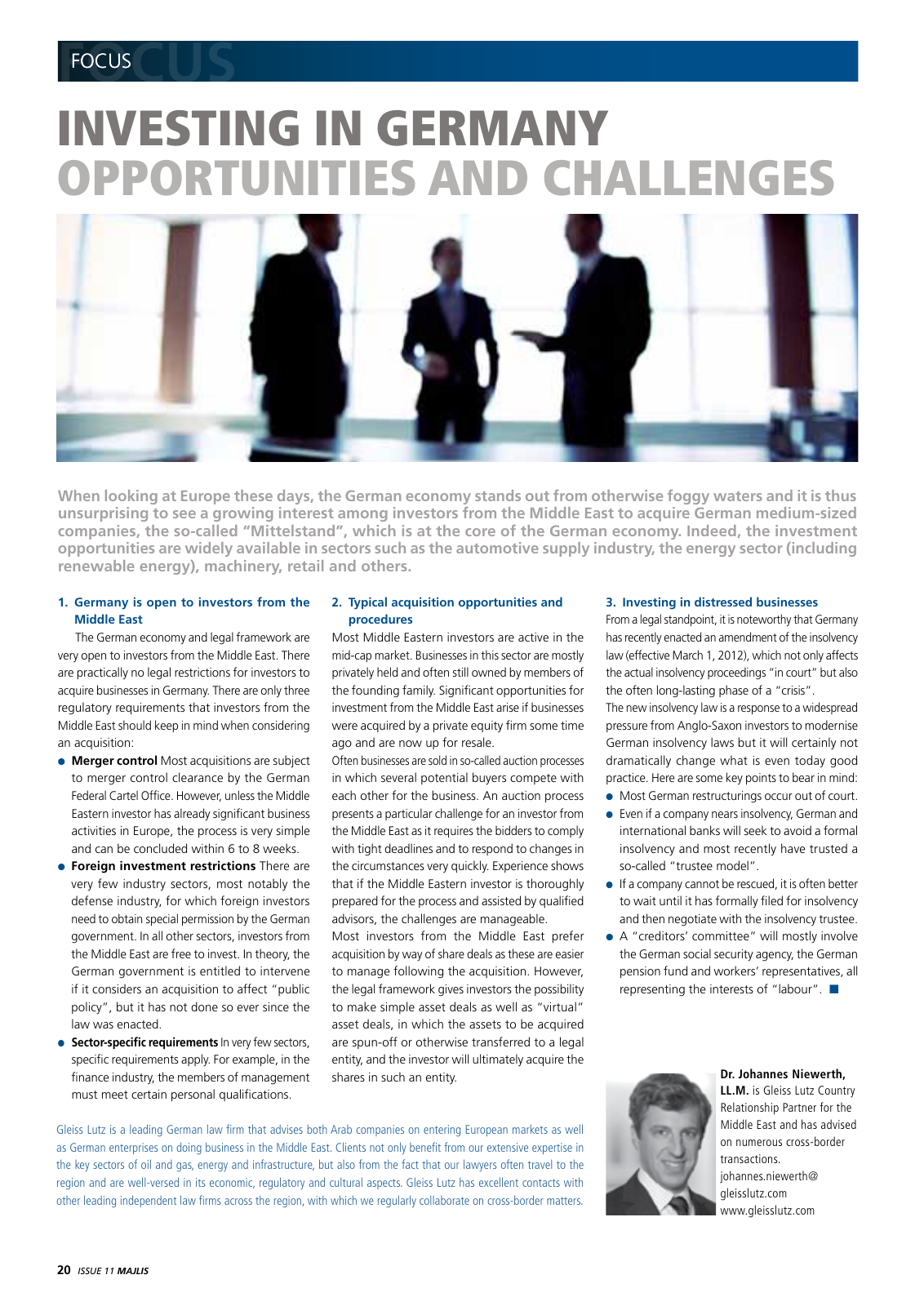Majlis Issue 11 Seite 22
Hinweis: Dies ist eine maschinenlesbare No-Flash Ansicht.Klicken Sie hier um zur Online-Version zu gelangen.
Inhalt
1 Germany is open to investors from the middle East The German economy and legal framework are very open to investors from the Middle East There are practically no legal restrictions for investors to acquire businesses in Germany There are only three regulatory requirements that investors from the Middle East should keep in mind when considering an acquisition merger control Most acquisitions are subject to merger control clearance by the German Federal Cartel Office However unless the Middle Eastern investor has already significant business activities in Europe the process is very simple and can be concluded within 6 to 8 weeks Foreign investment restrictions There are very few industry sectors most notably the defense industry for which foreign investors need to obtain special permission by the German government In all other sectors investors from the Middle East are free to invest In theory the German government is entitled to intervene if it considers an acquisition to affect public policy but it has not done so ever since the law was enacted Sector specific requirements In very few sectors specific requirements apply For example in the finance industry the members of management must meet certain personal qualifications 2 Typical acquisition opportunities and procedures Most Middle Eastern investors are active in the mid cap market Businesses in this sector are mostly privately held and often still owned by members of the founding family Significant opportunities for investment from the Middle East arise if businesses were acquired by a private equity firm some time ago and are now up for resale Often businesses are sold in so called auction processes in which several potential buyers compete with each other for the business An auction process presents a particular challenge for an investor from the Middle East as it requires the bidders to comply with tight deadlines and to respond to changes in the circumstances very quickly Experience shows that if the Middle Eastern investor is thoroughly prepared for the process and assisted by qualified advisors the challenges are manageable Most investors from the Middle East prefer acquisition by way of share deals as these are easier to manage following the acquisition However the legal framework gives investors the possibility to make simple asset deals as well as virtual asset deals in which the assets to be acquired are spun off or otherwise transferred to a legal entity and the investor will ultimately acquire the shares in such an entity 3 Investing in distressed businesses From a legal standpoint it is noteworthy that Germany has recently enacted an amendment of the insolvency law effective March 1 2012 which not only affects the actual insolvency proceedings in court but also the often long lasting phase of a crisis The new insolvency law is a response to a widespread pressure from Anglo Saxon investors to modernise German insolvency laws but it will certainly not dramatically change what is even today good practice Here are some key points to bear in mind Most German restructurings occur out of court Even if a company nears insolvency German and international banks will seek to avoid a formal insolvency and most recently have trusted a so called trustee model If a company cannot be rescued it is often better to wait until it has formally filed for insolvency and then negotiate with the insolvency trustee A creditors committee will mostly involve the German social security agency the German pension fund and workers representatives all representing the interests of labour n FOCUSFOCUS invEstinG in GErmany oPPortunitiEs and ChallEnGEs when looking at Europe these days the German economy stands out from otherwise foggy waters and it is thus unsurprising to see a growing interest among investors from the middle East to acquire German medium sized companies the so called mittelstand which is at the core of the German economy Indeed the investment opportunities are widely available in sectors such as the automotive supply industry the energy sector including renewable energy machinery retail and others Gleiss Lutz is a leading German law firm that advises both Arab companies on entering European markets as well as German enterprises on doing business in the Middle East Clients not only benefit from our extensive expertise in the key sectors of oil and gas energy and infrastructure but also from the fact that our lawyers often travel to the region and are well versed in its economic regulatory and cultural aspects Gleiss Lutz has excellent contacts with other leading independent law firms across the region with which we regularly collaborate on cross border matters dr Johannes niewerth LL M is Gleiss Lutz Country relationship partner for the Middle East and has advised on numerous cross border transactions johannes niewerth gleisslutz com www gleisslutz com 20 ISSUE 11 MAJLIs
